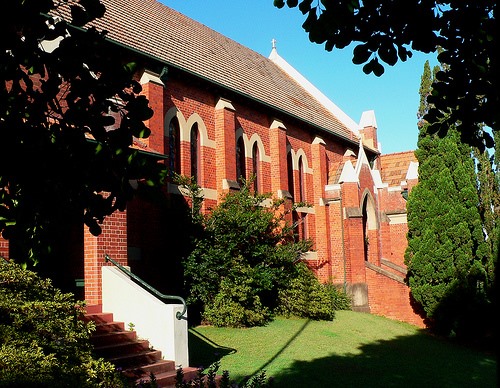

8
ly as much as was needed, so the church
was built one bay short of the original
design. In spite of this there was, as I
remember, a fairly substantial debt when
the building was finished.
So he instituted what he called “Direct
Giving” though I don’t know if this had
been done previously anywhere else.
He asked that all parishioners, on one
particular Sunday, should make an
offering of at least one pound each. Many
did – whole families of them – and many,
of course, gave more. There was one
who was very regular and generous, who
preferred to be known as ‘Argentine Joe’
and this name figured in the lists for many
years. I never found out who he was. The
scheme was quite a success and, so far as
I can recall, no fetes or bazaars were held
for parish fund raising during my people’s
time at St Augustine’s.
After one of the special services, when
the offertory had been quite substantial,
the treasurer warden reassured those
who had been helping with the counting
by producing a revolver, explaining that,
as a former banker, he’d learnt to take
precautions when money was concerned.
He then stowed the money in a gladstone
bag, laid the revolver on the money – and
locked the bag!
The very handsome altar frontal which
was used for many years was made by my
mother’s sister, Mrs Ethel Simpson who
lived in England. My father collected it
from the Customs Department arriving
back at the rectory shortly after noon. He
and my mother were admiring it when
my mother heard noises coming from
her bedroom like a blind tassel belting a
window pane. As she went to investigate
she realised there was little or no wind.
She was about to return when more tap-
ping sounds drew her eyes to the ceiling
and she saw, to her horror, that part of it
was glowing with fire. The sounds she
heard were the cracking and falling of the
asbestos-cement tiles.
So she raced to the ’phone but found that
the fire engine was already on its way for
someone living further up the hill had
given the alarm. Helpers streamed in
from all directions and much of the
rectory contents were saved. I expect the
altar frontal was given some priority. The
fire brigade made a good save, but most
of the roof, ceilings and the upper sections
of walls and partitions were destroyed and
the main damage to those contents which
couldn’t be moved was caused by fire
droppings and water. So the Armstrongs
moved to another temporary residence
whilst the rectory was being restored.
There used to be a small kindergarten
conducted in the church hall and many
well-known Queenslanders started their
scholastic careers as St Augustinians. The
children used to play a lot on the steep
grassy bank on the Rectory side of the
church. My mother remembered David
Anning spread-eagled against the church
wall shouting out, just prior to hurling
himself down the slope, “Everybody get
out of my way!” Since the others had
all been taken back into the school room
my mother felt that the order was a little
superfluous.
It was the same David who was being
taken to church by his mother but was
sent back to tidy his hair. As he couldn’t
find anything else to keep it in place, he
plastered it with butter. It was very warm
in the church and poor David had quite
a torrid time mopping up the streams of
melted butter which oozed from his hair
in all directions!
Looking back over fifty years – it seems
a long time – but memories remain green
and the church still stands!



















